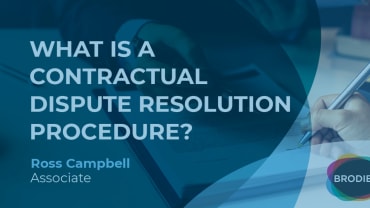My colleague Amina Jamil recently blogged on her experience of remote hearings in the English Courts. The Scottish Courts have now followed suit in resuming some hearings remotely. The Inner House of the Court of Session (Scotland's highest civil appeal court) is conducting appeals by video conference. The highest court of first instance, the Outer House, is progressing non-substantive hearings by telephone. Last week, I successfully conducted myfirst telephone hearing in Scotland's Supreme Courts, in the Court of Session's Commercial Court.
Ring, Ring
Telephone hearings are not new to the Scottish Court system. Procedural hearings in Sheriff Court commercial procedure are regularly held by telephone. Those hearings are usually quite tight affairs with the Sheriff calling one legal representative and then patching in the other. This hearing was a much more inclusive affair, with the Judge, their clerk, my opposing counsel and our instructing solicitors all dialling into conference facilities from separate locations. That sounds like a lot. However, as with a physical court hearing, only the Judge and counsel spoke during the call.
Advocacy Challenges
Appearing in Scotland's Supreme Courts from my spare bedroom was, I will admit, a little strange. So too was not being able to see the other participants. Those of us who practice advocacy are regularly reminded of the importance of body language in communication. That is true not only in presenting your case but also when "reading" the Judge and whether they are engaged with what you are telling them. Knowing when to speak and when to stop is more difficult. We all had to adapt to not having these physical prompts.
The Commercial Court is already set up to use electronic documents and the number of documents required for a procedural hearing like today's is normally limited. I was able to have two small bundles of electronic documents open on different screens and navigate them comfortably. However, in the Scottish court system there remains heavy reliance on paper documents. Advance planning of what documents will be referred to will help when there are volumes of paper documents, or very large electronic bundles required for a hearing.
The Future?
Remote hearings are going to be "the new normal" for some time. The Scottish Courts and Tribunal Service has indicated that few physical hearings will take place even when society moves into the next phase after "lockdown". Feedback from last week's video appeals has been positive. Arrangements are now being made for hearings by telephone in the Sheriff Appeal Court and extending their use in the Sheriff Court. Further technology might be deployed to allow hearings with evidence to go ahead. This, in turn, creates efficiencies. For example, lawyers and clients don't have to travel to court and wait for cases to call. Given the success so far, it would not be surprising if this was the start of a change in practice that will survive the future lifting of restrictions.
Contributor
Senior Associate & Solicitor Advocate











